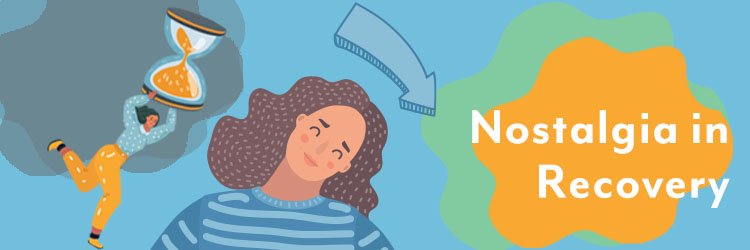[vc_row][vc_column][vc_column_text]Nostalgia happens. I remember circa 2006, 2007, people I hung out with were already reminiscing about the 90’s—honoring the decade by wearing big flannels and listening to TLC’s “Don’t Go Chasing Waterfalls.” It’s natural to feel wistful when you’re no longer living the day-to-day of that moment, with whatever struggles you faced then erased by distance.
I am grateful every day for sobriety. Every aspect of my life has gotten better. And still, I sometimes feel nostalgic for my pre-recovery days. While I understand this as a natural human experience, I also recognize that it can be dangerous. I don’t let the emotion sit unexamined.
When feelings of nostalgia kick in, I do three things. First, I try to understand it. In my case, I might be associating drinking and drugs with a period of my life. I’m in my 30’s, and I got sober three months before turning 29. While the 30’s has been the best decade of my life so far, my nostalgia feels more about the experience I had being in my 20’s than it does about drinking or using. What I miss sometimes is the chaos, the intensity—what I misread in those moments as excitement.
So now for the second thing: inserting realism. When I start to miss the “excitement,” I remind myself what it was really like beyond those highlight reels. I remember the pain, the crippling anxiety, the toxic relationships, and so much more that I don’t miss.
One time I told my therapist—who I have been seeing since a couple months before I got sober—that I was having nostalgia about drinking. She said, “You didn’t seem like you were having much fun then.” When I have these moments of wistfulness, I try to be my therapist’s voice in my head. I wasn’t having that much fun then—abusing substances is never fun.
In the recovery world, this line of thinking is sometimes called “playing the tape through to the end.” When you play the tape past that one unnuanced memory, you remember what would really happen in the end. This might be DUIs, loss of jobs or relationships, or something else specific to your situation. Once you remember the inevitable outcome of your drinking or using, it doesn’t seem exciting anymore.
After I have gone through these steps, the next thing I do is remind myself of the good things that have happened in sobriety. Sometimes I write down a list. Even if you are in a moment when you are feeling like nothing good has happened, try to write it down and see what comes out. You might be surprised at what you find. Or, you could instead make a list of the reasons why you got sober.
Making lists serves the dual purpose of reminding you why you shouldn’t drink or use, and distracting you from your nostalgic craving. If this doesn’t work, try to do something else entirely: go for a walk, talk to a friend, play an instrument, engage in some other hobby. The feeling—like all feelings—will pass.
When Lisa “Left Eye” Lopez of TLC wrote the lyrics to “Don’t Go Chasing Waterfalls,” she was in part inspired by her own struggle with drugs and alcohol. Rozanda Thomas of TLC later said of the lyrics, “Anything that’s self-destructive, that’s chasing a waterfall.” Nostalgia can be the precursor to chasing a waterfall, but it certainly doesn’t have to be.










